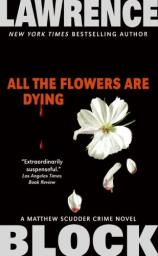All the Flowers Are Dying
Review
All the Flowers Are Dying
Matthew Scudder is arguably the most popular of Lawrence Block's
numerous creations. Scudder has aged roughly in real time, so there
are countless readers who have grown up, and grown old, with him.
An ex-cop, ex-private investigator (at least officially) and a
recovering alcoholic, Scudder is still not afraid to get his hands
dirty on occasion within the few square blocks of Manhattan that he
continues to call his own.
ALL THE FLOWERS ARE DYING is a new and welcome Scudder tale, a good
deal of which alternates back and forth between Scudder and his
adversary. Scudder has agreed to investigate the online lover of an
acquaintance. Meanwhile, a man is put to death in a Virginia
penitentiary while another man, who ingeniously and calculatedly
framed him for a series of murders, watches the execution in quiet
fascination before returning to New York City. It seems that the
fiend has unfinished business with Scudder and with Scudder's love,
Elaine. The alternating narrative is at first a distraction but
it's a necessary one; there is, to turn a phrase, a madness to
Block's method, one that is made slowly and terrifyingly
clear.
Block drops little clues along the way, not giving away enough to
reveal anything significant but more than enough to keep the reader
interested. He also peppers the novel with factoids about New York
City, some of which lifelong residents may be unaware. Others ---
the address numbering system on the avenues, for example --- will
hold occasional visitors to the city in good stead. The principal
focus of this work, however, is Scudder, a complex and interesting
character who is endearing both as a result of and in spite of his
strengths and weaknesses.
Those who have never read one of Block's Scudder novels can pick up
ALL THE FLOWERS ARE DYING without trepidation. Though the story has
its roots in the past, the narrative reveals just enough to keep
the reader informed while whetting potential interest in what has
gone before. Longtime readers will certainly find it a welcome
addition to the Scudder mythos. Recommended.
Reviewed by Joe Hartlaub on December 22, 2010





